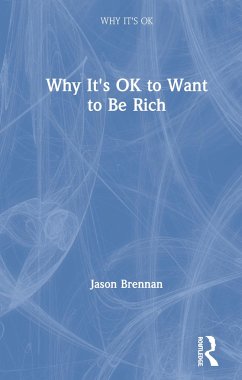"Is it OK to want money? With his trademark blend of philosophical analysis, social scientific data-mining, and norm-busting verbal pyrotechnics, Jason Brennan argues that it's more than just OK. Wanting to become rich is how we make our world a better place and, along the way, author lives that are genuinely our own."
-John Tomasi, Brown University
"Do you own a BMW? Are you already in business school? If so, then maybe put this book down and instead consider getting into something a bit less comfortable by Marx, Fanon, Foucault, or Elizabeth Anderson. But for the rest of us, Why It's OK to Want to Be Rich is an exhilarating, illuminating, mildly terrifying ride. Provocative and challenging at every beautifully-handled turn, drawing on a wealth of economics and psychology, this direct little book sets out the moral case for money-making it, spending it, even luxuriating in it, and not feeling bad about it. Many of us raised in the wealthiest, most capitalist, happiest societies in human history have been taught to react to such ideas with a complex mixture of rage and guilt. You might already want to throw this book across the room. Fine, fine. But read it first. You might learn something-about money, about markets, about economics, even about yourself. If nothing else, I know of no better, faster introduction to the moral case for capitalism. It is the kind of book that enriches all of us, even if-and perhaps especially if-we are inclined to disagree with it."
-Alex Guerrero, Rutgers University
-John Tomasi, Brown University
"Do you own a BMW? Are you already in business school? If so, then maybe put this book down and instead consider getting into something a bit less comfortable by Marx, Fanon, Foucault, or Elizabeth Anderson. But for the rest of us, Why It's OK to Want to Be Rich is an exhilarating, illuminating, mildly terrifying ride. Provocative and challenging at every beautifully-handled turn, drawing on a wealth of economics and psychology, this direct little book sets out the moral case for money-making it, spending it, even luxuriating in it, and not feeling bad about it. Many of us raised in the wealthiest, most capitalist, happiest societies in human history have been taught to react to such ideas with a complex mixture of rage and guilt. You might already want to throw this book across the room. Fine, fine. But read it first. You might learn something-about money, about markets, about economics, even about yourself. If nothing else, I know of no better, faster introduction to the moral case for capitalism. It is the kind of book that enriches all of us, even if-and perhaps especially if-we are inclined to disagree with it."
-Alex Guerrero, Rutgers University









